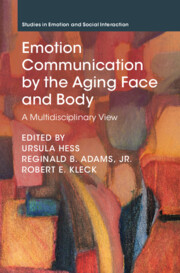Book contents
- Emotion Communication by the Aging Face and Body
- Studies in Emotion and Social Interaction
- Emotion Communication by the Aging Face and Body
- Copyright page
- Contents
- Figures
- Tables
- Contributors
- Preface: Communicating Emotion with an Aging Face and Body
- Part I Basic Processes
- Part II Aging and Aging Stereotypes
- Part III Impact of Aging Cues on First Impressions and Emotion Communication
- Part IV The Effects of Facial Movement Impairment of Emotion Communication
- Part V Methodological Approaches to the Study of the Effects of Aging on Emotion Communication
- Chapter 11 Computer Vision for the Study of Older (and Younger) Adult Faces
- Chapter 12 Using Data-Driven Methods to Advance Knowledge of Social Face Perception
- Conclusion The Aging Body
- Index
- Studies in Emotion and Social Interaction
- References
Conclusion - The Aging Body
A Proposal for Future Research
from Part V - Methodological Approaches to the Study of the Effects of Aging on Emotion Communication
Published online by Cambridge University Press: 07 December 2023
- Emotion Communication by the Aging Face and Body
- Studies in Emotion and Social Interaction
- Emotion Communication by the Aging Face and Body
- Copyright page
- Contents
- Figures
- Tables
- Contributors
- Preface: Communicating Emotion with an Aging Face and Body
- Part I Basic Processes
- Part II Aging and Aging Stereotypes
- Part III Impact of Aging Cues on First Impressions and Emotion Communication
- Part IV The Effects of Facial Movement Impairment of Emotion Communication
- Part V Methodological Approaches to the Study of the Effects of Aging on Emotion Communication
- Chapter 11 Computer Vision for the Study of Older (and Younger) Adult Faces
- Chapter 12 Using Data-Driven Methods to Advance Knowledge of Social Face Perception
- Conclusion The Aging Body
- Index
- Studies in Emotion and Social Interaction
- References
Summary
This volume set out to compile the state of the art of research on the perception of emotions in the aging face and body. Notably, older adults are the fastest growing age group in the world (United Nations, 2020). Yet, whereas a large body of research has focused on the ability of the elderly to perceive and use emotional information, very few studies have addressed the problem from the perspective of the (young) perceiver.
As outlined in the chapters of this book, with advancing age the very instruments of expressing emotional states (e.g., faces and bodies) change. Thus, advancing age (perhaps particularly after the age of seventy) dramatically changes facial appearance, movement behaviors, posture, gait, and vocal characteristics that are critical to social communication. Importantly, people do not only perceive emotions in others but they also use these perceived emotions (which notably can also be derived from supposedly neutral faces) to draw inferences about those others (Hareli & Hess, 2010).
- Type
- Chapter
- Information
- Emotion Communication by the Aging Face and BodyA Multidisciplinary View, pp. 308 - 312Publisher: Cambridge University PressPrint publication year: 2023



